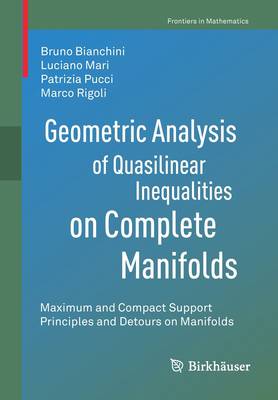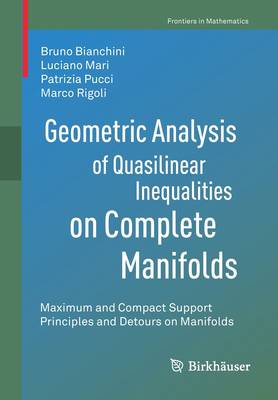
Bedankt voor het vertrouwen het afgelopen jaar! Om jou te bedanken bieden we GRATIS verzending (in België) aan op alles gedurende de hele maand januari.
- Afhalen na 1 uur in een winkel met voorraad
- In januari gratis thuislevering in België
- Ruim aanbod met 7 miljoen producten
Bedankt voor het vertrouwen het afgelopen jaar! Om jou te bedanken bieden we GRATIS verzending (in België) aan op alles gedurende de hele maand januari.
- Afhalen na 1 uur in een winkel met voorraad
- In januari gratis thuislevering in België
- Ruim aanbod met 7 miljoen producten
Zoeken
Geometric Analysis of Quasilinear Inequalities on Complete Manifolds
Maximum and Compact Support Principles and Detours on Manifolds
Bruno Bianchini, Luciano Mari, Patrizia Pucci, Marco Rigoli
€ 91,95
+ 183 punten
Omschrijving
This book demonstrates the influence of geometry on the qualitative behaviour of solutions of quasilinear PDEs on Riemannian manifolds. Motivated by examples arising, among others, from the theory of submanifolds, the authors study classes of coercive elliptic differential inequalities on domains of a manifold M with very general nonlinearities depending on the variable x, on the solution u and on its gradient. The book highlights the mean curvature operator and its variants, and investigates the validity of strong maximum principles, compact support principles and Liouville type theorems. In particular, it identifies sharp thresholds involving curvatures or volume growth of geodesic balls in M to guarantee the above properties under appropriate Keller-Osserman type conditions, which are investigated in detail throughout the book, and discusses the geometric reasons behind the existence of such thresholds. Further, the book also provides a unified review of recent results in the literature, and creates a bridge with geometry by studying the validity of weak and strong maximum principles at infinity, in the spirit of Omori-Yau's Hessian and Laplacian principles and subsequent improvements.
Specificaties
Betrokkenen
- Auteur(s):
- Uitgeverij:
Inhoud
- Aantal bladzijden:
- 286
- Taal:
- Engels
- Reeks:
Eigenschappen
- Productcode (EAN):
- 9783030627034
- Verschijningsdatum:
- 19/01/2021
- Uitvoering:
- Paperback
- Formaat:
- Trade paperback (VS)
- Afmetingen:
- 196 mm x 236 mm
- Gewicht:
- 453 g

Alleen bij Standaard Boekhandel
+ 183 punten op je klantenkaart van Standaard Boekhandel
Beoordelingen
We publiceren alleen reviews die voldoen aan de voorwaarden voor reviews. Bekijk onze voorwaarden voor reviews.









